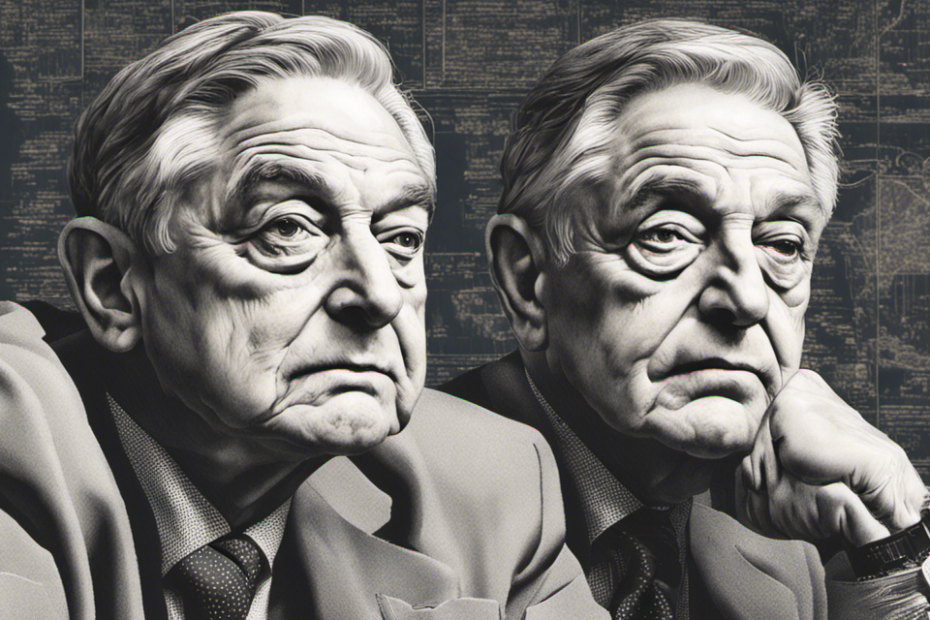Introduction
George Soros, a name that resonates with both the financial and philanthropic world, is a figure of immense influence and distinction. Born in Hungary and making his mark in America, Soros’ investment strategies and financial acumen have made him one of the world’s wealthiest individuals.
Soros and the Financial Markets
In the financial markets, Soros’ name is synonymous with success, innovation, and sometimes controversy. His role in significant market events, such as the 1992 currency crisis, underlines his importance and influence. Soros’ unique approach to investing, which combines macroeconomic analysis with highly leveraged bets, has made him a formidable figure in the field of investment.
His ability to read economic trends and translate them into profitable investment strategies, most notably in currency speculation, has earned him significant profits. His actions on a global scale have often stirred the market, making Soros a game-changer in true sense.
The Quantum Fund and Soros’ Investment Strategy
George Soros is also the brains behind the Quantum Fund, a hedge fund that has seen enormous success. His investment strategy, driven by his Reflexivity Theory, has challenged traditional market theories and has often proven to be a winning formula.
Soros’ Financial Influence
Beyond the realms of investment and currency speculation, Soros has extended his influence to philanthropy and politics. He is the founder of the Open Society Foundations and has made significant political donations, primarily to Democratic candidates. His involvement in these spheres has made him a notable figure not just in the financial world, but globally.
In the coming sections, we delve deeper into Soros’ major trades, his theory of reflexivity, and how he managed to break the Bank of England. Stay tuned to uncover the strategies of one of the most successful investors in history.
George Soros’ Investment Philosophy
The Essence of Soros’s Philosophy
George Soros is a name that resonates powerfully in financial markets. Known for his dynamic investment strategy, Soros’ philosophy is centered around his unique global macro strategy. Unlike traditional investors who hold long-term positions, Soros is a short-term speculator. He believes in making colossal, highly-leveraged bets on the direction of financial markets, relying on currency rates, commodity prices, stocks, bonds, derivatives, and other assets to steer his investments.
Soros’ philosophy is deeply rooted in the theory of reflexivity. This theory suggests that the expectations and actions of market participants can directly influence market fundamentals, thereby creating unique investment opportunities. Soros’ reflexivity theory is a cornerstone of his investment strategy, acting as his guiding light in the complex labyrinth of financial markets.
Reflexivity Theory and Soros’ Investment Strategies
The reflexivity theory is a concept that Soros applies meticulously to his investing This theory posits that investors’ perceptions and actions significantly impact market dynamics, leading to potential market booms and busts. This cyclical feedback loop between investors’ perceptions and market fundamentals forms the crux of Soros’ investment strategies.
Soros uses reflexivity to predict market bubbles and other investment opportunities. He is not just a passive observer but actively influences the market through his massive trades. His approach is indicative of a scientific method, where he tests his theories with smaller investments before scaling up based on their success.
Soros’ Impact on Financial Markets
Soros’ investment philosophy and strategies have had a profound influence on financial markets. His Quantum Fund, a prominent hedge fund, exemplifies his daring approach to investing. His most notable trade, known as “The man who broke the Bank of England”, was a high-risk bet against the British pound, which yielded him an estimated $1 billion profit in a single day. This currency speculation venture solidified Soros’ standing in global financial markets and demonstrated the potency of his investment strategy.
Soros’ financial influence extends beyond making profitable trades. He combines his passion for social change with his investment philosophy, integrating the principles of free markets, human rights, and scientific inquiry into his strategies. This unique blend of financial acumen and social consciousness defines Soros’ approach to investing, making him an influential figure in financial markets.
In conclusion, George Soros’ investment philosophy, characterized by his belief in reflexivity theory and a global macro strategy, has significantly shaped his approach to investing. His daring bets and unique perspective on market dynamics have made him one of the most influential figures in the world of finance. This philosophy continues to guide his investment strategies, making him a figure to study for anyone interested in understanding the dynamics of financial markets.
Major Trades and Market Influence
George Soros has made a significant impact on the financial markets over the years, primarily due to his major trades and investment strategy. One of the most notable instances where Soros’ influence was keenly felt was when he bet against the British Pound in 1992.
The Pound Sterling Trade
In a bold move, Soros utilized his Quantum Fund strategy to bet against the Bank of England, speculating that the British Pound would devalue. His prediction was spot on. The British government was forced to withdraw the Pound from the Exchange Rate Mechanism (ERM), and as a result, the Pound fell significantly against other major currencies. This event, often referred to as ‘Black Wednesday,’ resulted in Soros making a profit of around $1 billion.
This trade had a profound impact on the financial markets. It demonstrated the power of currency speculation and the potential for a single investor to influence a nation’s economy.
Soros’ Global Macro Strategy
Soros’ investment philosophy is based on the Reflexivity Theory, which posits that market values are often driven by the fallible ideas of participants, rather than underlying economic fundamentals. This theory shaped his global macro strategy, where he makes massive, one-way bets on the movements of currency rates, commodity prices, stocks, bonds, derivatives, and other assets based on macroeconomic analysis.
Through this strategy, Soros has made a series of major trades that had significant implications on the financial markets. Here’s a brief overview of some of his trades:
| Soros’ Major Trades | Market Conditions | Impact on Financial Markets |
|---|---|---|
| Bet against the British Pound (1992) | High interest rates in the UK, economic instability | Forced the Pound out of the ERM, Pound devalued |
| Bet against Asian currencies during Asian Financial Crisis (1997) | Overvalued currencies, economic instability | Contributed to the devaluation of several Asian currencies |
| Bet against the Japanese Yen (2012) | Expansion of monetary easing policy in Japan | Yen weakened against the dollar |
Impact on Financial Markets
Soros’ trades often result in significant market movements and have the potential to reshape the financial landscape. For instance, his bet against the British Pound sent shockwaves through the markets, leading to a lack of trading and fostering anxieties among banks about their outstanding loans.
Similarly, his trades during the Asian Financial Crisis contributed to the devaluation of several Asian currencies and created inefficiencies in the markets. These shifts in market relationships affected trading strategies and destabilized market arrangements.
Soros’ trades illustrate how speculative trading and the actions of individual investors can have far-reaching consequences in the financial markets. The trades also underscore Soros’ financial influence and his legacy as one of the most successful investors in history.
In conclusion, George Soros’ major trades not only demonstrate his keen understanding of market movements and his unique investment strategy, but also his immense influence on global financial markets. His trades have shaped market trends, influenced trading strategies, and altered the course of economies, making him a true titan of the financial world.
Conclusion
In the realm of financial markets, George Soros has solidified his status as a distinguished figure. His investment strategy, deeply rooted in the Reflexivity Theory, and his major trades, like the famous bet against the Bank of England, have earned him a legendary reputation. Soros’ prowess, underpinned by his Quantum Fund, has wielded significant financial influence on global markets, especially in currency speculation.
Lessons from Soros
Modern investors looking to navigate the volatile oceans of financial markets can draw valuable lessons from Soros’ strategies. The understanding of Reflexivity Theory, the astute study of economic trends, exploiting market inefficiencies, and the rigorous testing and adapting of investment ideas are all key facets of Soros’ strategy that can be emulated. Soros’ emphasis on patience, discipline, and the importance of seeking contrary views provides a holistic approach to investment that goes beyond mere numbers and charts.
Soros’ Legacy
In conclusion, George Soros’ influence on the financial markets transcends his personal success. He has created a blueprint for investment strategies that has shaped the industry. His impact continues to reverberate across financial markets, guiding both novices and experienced investors, underscoring the importance of deep market understanding, clear strategy, and unwavering discipline. As we navigate the complex world of stocks and trades, the teachings of George Soros serve as a compass, guiding us towards informed and strategic decision-making in the financial markets.
FAQ
Who is George Soros?
George Soros is a legendary figure in the world of finance, known for his astute investment strategies and major influence on financial markets. He rose to prominence in 1992 when he made a daring bet against the Bank of England, short-selling $10 billion worth of pounds sterling during the Black Wednesday UK currency crisis. This audacious move earned Soros the moniker “The Man Who Broke the Bank of England”, and cemented his reputation as one of the most successful investors in the world.
What is George Soros’ Investment Philosophy?
Soros’ investment philosophy hinges on the Reflexivity Theory. This theory posits a feedback loop between investors’ perceptions and economic fundamentals. Essentially, Soros believes that investors’ perceptions can shape economic realities, which then in turn affect investors’ perceptions, creating a self-reinforcing cycle. This cycle can lead markets to deviate significantly from equilibrium prices, resulting in prices becoming detached from the underpinning reality. Soros’ Reflexivity Theory challenges many mainstream economic theories and has been a cornerstone of his investment strategy.
What is the Quantum Fund?
The Quantum Fund is a private investment fund that George Soros co-founded in 1973. Known for its global macro strategy, the fund has been instrumental in Soros’ financial success. It focuses on investing in economic trends predicted by fundamental market analysis. The Quantum Fund’s success is a testament to Soros’ mastery of financial markets and his innovative investment approach.
What Criticisms Surround George Soros?
Despite his success, Soros’ strategies have not been without controversy. Critics argue that his attempts to influence governments and manipulate markets are ethically questionable. Furthermore, some are concerned about the extent of his influence on public affairs, given his wealth. Critics also note that Soros’ emphasis on the power of ideas may sometimes overlook the inertia of ideological obstacles. However, despite these criticisms, Soros’ achievements in the world of finance remain unmatched.
What is George Soros’ Legacy in the Financial World?
George Soros’ legacy in the financial world is as influential as it is controversial. His investment strategies and major trades have left an indelible mark on financial markets. His theories, particularly the Reflexivity Theory, have challenged traditional economic thinking and have been instrumental in shaping investment strategies worldwide. Despite the criticisms, Soros’ impact on the financial markets is undeniable, making him a figure of central significance in the world of finance.
my vision is To create a community of informed and empowered investors who, armed with robust knowledge and strategies, can make prudent and profitable investment decisions.

